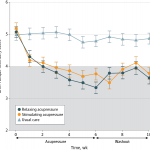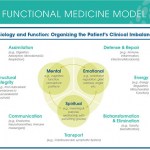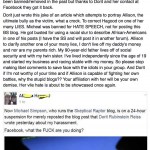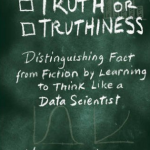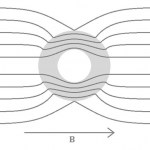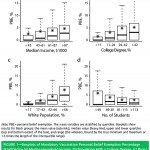Education
Classes start on Monday. I knew that intellectually, of course, but I had it brought home to me a few days ago when I innocently drove onto the campus, only to find a traffic jam and crossing guards directing the cars. Students were moving into the dorms, you see.
Higher education is beset with problems nowadays, and I can recite the litany as well as any faculty member. But for all the legitimate complaints, the bottom line is that I still think I have the best job in the world. I get out of bed in the morning excited to go to work, and the upsides of my job vastly outweigh the downsides…
In the early days of 2016, my attention was drawn to a local antivaccine doctor of whom I’d heard before but never really paid much attention to. What caught my eye was a blog exchange between this “holistic” family practitioner and former Scienceblogs blogger, friend, and local internist Peter Lipson over this physician’s blog posts attacking a local Jewish summer camp for children for its new requirement that campers must be up to date on their vaccinations as a requirement for attending. Not surprisingly, Dr. Lipson took the side of science and refuted the antivaccine nonsense that had…
I was originally going to write this post for the 4th of July, given the subject matter. However, as regular readers know, I am not unlike Dug the Dog in the movie Up, with new topics that float past me in my social media and blog reading rounds serving as the squirrel. But never let it be said, though, that I don't circle back to topics that interest med. (Wait, strike that. Sometimes, that actually does happen. After all, I have been at this nearly 12 years now. It just didn't happen this time.) This time around, I will be using documents forwarded to me by a reader as a means of revisiting…
Given the study that I’m going to discuss, I can’t help but start out with a brief (for me) reminiscence. Longtime readers know that I graduated from the University of Michigan Medical School in the late 1980s. Back when I attended U. of M., its medical school was considered stodgy and hard core even by 1980s standards. No organ systems approach to education for U. of M.! Oh, no. It didn’t matter that the organ systems approach, in which all classes are organized by organ systems and teach the same organ systems at roughly the same time (e.g., biochemistry teaching the biochemistry of the…
When a group of researchers supported by the HHS Office on Women's Health set about designing a weight-loss intervention for lesbian and bisexual (LB) women, they ran into a challenge: Many lesbian and bisexual women are averse to the idea of weight loss. Although LB women are more likely to be overweight or obese than their heterosexual counterparts, they are less likely to consider themselves overweight. The researchers conducted focus groups with LB women (some involving only overweight participants), and learned that participants often didn't prioritize weight loss, but did want to be…
Dr. Jodi Sherman wants to expand the medical profession’s understanding of patient safety far beyond the exam room and hospital bed. For Sherman, the oft-heard medical mantra of “first do no harm” should also push the health care system to do more to reduce its harmful air emissions and their impact on people’s health.
“Traditionally, our duty has been to the patient in front of us,” Sherman told me. “But we have a duty to protect society as well.”
Sherman, an assistant professor of anesthesiology at Yale School of Medicine, recently co-authored a new study on harmful air pollutants coming…
Over the years, I’ve taken care of women with locally advanced breast cancer so advanced that it’s eroded through the skin, forming huge, nasty ulcers filled with stinky dead cancer tissue that’s outgrown its blood supply, leaving the patient in chronic pain. If the patient is fortunate, her cancer has not metastasized beyond her axillary lymph nodes (the lymph nodes under her arm), and her life might still be saved by a combination of chemotherapy, radical surgery, and radiation. If the patient is not fortunate, either the cancer has metastasized and she is doomed or hasn’t metastasized yet…
It’s been 15 years since worker safety advocates in Puerto Rico first began fighting against a proposal to dilute the qualifications associated with being a professional industrial hygienist. As part of their efforts, such advocates developed their own proposal to protect the livelihoods of those with the knowledge and experience to properly protect workers. And after years of work, they may finally cross the finish line victorious.
“We’re really hopeful it works out and we’ll see the light of day,” said Lida Orta-Anés, professor in the Industrial Hygiene Program at the University of Puerto…
As regular readers of this blog and related blogs know, over the last two or three decades there has been a successful effort to legitimize quackery in the form of what is now called “integrative medicine.” Three decades ago, modalities like homeopathy, acupuncture, much of traditional Chinese medicine, reflexology, chiropractic, and many other modalities based on vitalism, prescientific mysticism, and pseudoscience were rightly referred to as quackery. Then in the 1990s came “complementary and alternative medicine” (CAM), a term that sought to sand the rough edges of quackery off of the,…
I often describe "integrative medicine" as integrating quackery with medicine because that's what this inadvertently appropriately named branch of medicine in essence does. The reason, as I've described time and time again, is to put that quackery on equal footing (or at least apparently equal footing) with science- and evidence-based medicine, a goal that is close to being achieved. Originally known as quackery, the modalities now being "integrated" with medicine then became "complementary and alternative medicine" (CAM), a term that is still often used. But that wasn't enough. The word "…
Computers, biological data (molecular sequences, structures, and other data), websites, and databases are integral to modern research. Innovations like precision, or personalized medicine, expect a certain level of patient participation, and our future food and environmental sustainability will require that society can access a multitude of computer-based resources. Thus, higher education has an important role in providing students with employable skills as well as the ability to use data to make important personal and societal decisions. Toward that goal it is worthwhile understanding…
There are a number of aphorisms that one imbibes over many years of medical education, especially in medical school. Some are useful; some are not; but some stick with you for reasons that even you can't figure out. For example, I still remember my first day of medical school over 30 (!) years ago. It started with an introductory session beginning at 8 AM that lasted about an hour, an "orientation," if you will, after which classes began as normal. During this orientation, members of the medical school leadership, such as deans and the chairs of certain major departments, got a chance to…
Nearly eleven years ago, back in April 2005, I opened my work e-mail (I was working at a different university back then) and saw an e-mail from someone whose name I had seen before, one Mr. William P. O'Neill. Opening the e-mail, I was shocked to find an e-mail to Orac; worse, the e-mail was cc'ed to my cancer center director, my division chief, and my chairman. In it, O'Neill outed me as Orac and was threatening to sue me over a post I did. Naturally, it was interspersed with accusations of my being a "pharma shill" and having lied about him. Now here's the odd thing. This is the post that…
It's a seldom mentioned aspect of my professional history that I used to do a lot of trauma surgery in my youth. I did my residency at a program that included a county hospital with a busy trauma program where I saw quite a bit of vehicular carnage and an urban hospital (which has since closed) where I saw a fair amount of what we in the surgery biz call gun and knife club action. During my time as a PhD student, I moonlighted as a flight physician for the local helicopter rescue service, Metro Life Flight, where I took care of patients with everything from cardiac disease requiring transfer…
Truth or Truthiness: Distinguishing Fact from Fiction by Learning to Think Like a Data Scientist is a new book by Howard Wainer that can serve as a manual for how to be a good skeptic.
Wainer is a statistician, formerly with the famous Educational Testing Service, and a professor at the Wharton School of the University of Pennsylvania. He is well known for his work in statistics and data presentation.
You know what "truthiness" is. It is a term coined by Stephen Colbert in 2005 to refer to assertions that are clearly true because of how they look, feel, smell, but that are in fact, not…
USA TODAY’s Laura Ungar highlights an important measure in the omnibus spending bill Congress passed last month: It lifts the ban on the use of federal funds for needle-exchange programs. State and local needle-exchange programs still can’t use federal money to purchase needles, Ungar explains, but they can use it for staff, vans, outreach, and other expenses that typically cost far more than the syringes themselves.
Needle exchanges — also called syringe service programs (SSPs) — allow injection drug users to avoid sharing needles, a practice that can spread HIV, hepatitis C, and other…
"Observing quasars is like observing the exhaust fumes of a car from a great distance and then trying to figure out what is going on under the hood." -Carole Mundell
Have you been tunes in to Starts With A Bang during this past week? The first full week of January brings with it the annual American Astronomical Society's giant meeting, and some of the most important discoveries and developments of the year! If you missed anything, here's what we've covered:
Is interstellar travel possible? (for Ask Ethan),
A distant galaxy cluster reveals the power of Einstein's…
Vaccines and the antivaccine movement were in the news a lot in 2015. The year started out with a huge measles outbreak originating at Disneyland over the holidays last year and dominated news coverage in the early months of 2015. This outbreak had enormous consequences. It galvanized public opinion such that something I had never thought possible before, least of all in the hotbed of the antivaccine movement that is California, became possible. After a prolonged debate, the California legislature passed SB 277, a law that, beginning with the 2016-2017 school year, eliminated nonmedical…
I’ve been blogging for a bit more than ten years now, having started on 16 December, and today Aard turns nine! I was inspired to begin blogging by my wife who started in October 2005. She worked as a news reporter at the time, and journalists were early adopters in Swedish blogging. I was doing research on small grants and applying for uni jobs.
In late 2005 we were living happily in a three-room apartment in a former council tenement, my son had just started school and my daughter was a baby. Things have changed a bit over these ten years as we've moved into middle age: both kids are now…
During the holiday season, Kim, Liz and I are taking a short break from blogging. We are posting some of our favorite posts from the past year. Here’s one of them, originally posted on June 26, 2015:
By Kim Krisberg
A common hurdle in the field of occupational health and safety is delivering what can sometimes be life-saving information to the people who need it most. After all, not all employers are amenable to workplace health and safety education. But what if safety advocates could find and connect with the most at-risk workers out in the community? Perhaps even reach vulnerable workers…

